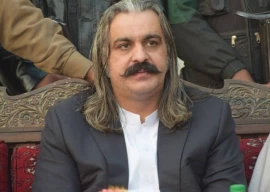
Jilani’s term at the helm of the Supreme Court (SC) began last year after his firebrand predecessor, Iftikhar Muhammad Chaudhry, stepped down following eight tumultuous years in office, often marked by political tug-o’-war.
Unlike his predecessor, who was accused of meddling in government affairs, Justice Jillani’s term is credited with adopting the policy of ‘judicial restraint’ and bringing to a close years of judicial activism.
The 65-year-old judge, who is due to leave office on July 5 will be succeeded by Justice Nasirul Mulk as the chief justice. Mulk, known as the ‘English judge’, will serve for a period of 13 months.
Justice Jilani took office at a time when suo motu had become a household phrase in the country, as the former chief justice picked up populist causes highlighted by the media, and hauled ministers and government officials over corruption allegations.
Interestingly, during his term as the country’s top judge, Jilani barely took any suo motu action over financial irregularities in state institutions.
A recent SC judgment in the Prime Minister’s discretionary fund case allowed the government to release funds for development projects if “it is a scheme of national or public interest” without taking parliament’s approval, which was required after an earlier verdict delivered during the former chief justice’s term on December 5, 2013.
On the contrary, leniency exercised by Jilani’s court towards the government has enabled officials to defy its orders without the fear of punitive action - most commonly enforced during the Chaudhry era.
A senior law officer in Attorney General’s office admitted that government functionaries were not taking judicial orders seriously as they did during Chaudhry’s term as the top judge.
Similarly, Raheel Kamran Sheikh, a senior advocate, who appears before the court in several public interest cases said that the government has taken four months to file a reply in the ongoing fishermen case.
This has prompted an unprecedented surge of criticism directed at the chief justice by lawyers and superior bars over the appointment of civil servants on key posts in the court’s administration wing.
Supreme Court Bar Association (SCBA) president has also raised a red flag over the appointment of former SC’s registrar, Dr Faqir Hussain, a close associate of the former CJ, as Director General Federal Judicial Academy (FJA).
On the other hand, court officials said that Jilani’s term also witnessed an increase in the disposal rate of cases that soared during the former CJ’s tenure.
Ordinary litigants, who came from far-flung areas of the country to appear before the court, faced immense hardships during former CJ’s era as their cases were adjourned due to the prolonged proceedings of high-profile cases, a lawyer said.
To deflate the burgeoning case list, the chief justice constituted a bench, headed by Justice Asif Saeed Khan Khosa, only to hear criminal cases. It is expected that all the pending appeals in such cases is likely to be disposed of in the near future.
Similarly, the court’s Human Right wing received 40,000 applications, out of which more than 27,000 complaints have been disposed of in last six months.
Justice Jillani took the Supreme Court’s reins at a time when tensions between the executive and the Judiciary had reached boiling point over the contentious case involving 35 missing persons and holding Local Government (LG) elections in the country.
However, soon after Justice Chaudhry’s retirement, the LG polls were deferred on the grounds that provincial governments did not have the authority to conduct the delimitation process.
Since then, critics have raised questions over the policy of ‘judicial restraint’ adopted by the Jilani court in several matters including LG polls in Islamabad and cantonment areas.
Several important cases including the appointment of a permanent Chief Election Commissioner were also taken up during Jilani’s term as the top judge. However, the case has not been fixed for hearing since February which has irked the legal fraternity.
Some of his initiatives have won praise from all quarters. During Jilani’s stint, the SC fixed cases involving missing persons in four different benches. Frequent hearings led to the recovery of several people during the year.
As his time in office ends, top jurists have praised Justice Jillani for discouraging frivolous petitions that are filed by habitual petitioners on different issues.
Former vice chairman of Pakistan Bar Council (PBC) Akhtar Hussain hailed the 32-page landmark judgment on minorities’ rights as the biggest achievement of the soon-to-be-retired chief justice.
He said Jillani had enjoyed good relationship with the bars which had gone sour during his predecessor’s tenure.
Published in The Express Tribune, June 30th, 2014.
COMMENTS (10)
Comments are moderated and generally will be posted if they are on-topic and not abusive.
For more information, please see our Comments FAQ








1732776427-0/Express-Tribune-(1)1732776427-0-270x192.webp)

1732776989-0/Untitled-design-(71)1732776989-0-270x192.webp)






@Adnan: He is Jalil Abbas Jilani, nephew of the CJ. But as far as I know, he was not made Pakistan Ambassador to the US because of his relationship with the CJ. Prior to this appointment, Jalil Abbas has been the Foreign Secretary from March 2012 to December 2013. He has also served as Ambassador of Pakistan to Belgium, Luxembourg and the European Union. You can find these facts on the Internet as well.
“Without a perfect legal system, a small group or even a single family can take control of an entire country.” If Pakistan citizens want to get rid of such groups or families there is an easy and peaceful way to get rid of them: Change the system! which is Tahir ul Qadri's agenda.
@Adnan the US ambassador is his nephew!
The article is finished but my head is still spinning. JuDgEs.
what to us ???
Company Brand judge, Lenient judge, Gentlemen judge, English judge. For me they are all German Judges.
is the recently appointed US ambassador CJ's brother?
What the ex PCO CJ could not do in 8 long years some expect CJ Jilani to do in only 7 months! In such a short time he has finished tens of thousands of cases rotting for decades and the petitioners in jail. What an irony that such a great CJ cannot get extension while the PCO CJ was forever.
C.J Sb. WHAT ABOUT THE MAJORITY ! What you have DID for INJUSTICE and DELAYS happening on Daily basis in our SOCIETY, POLICE STATION and in LOWER & UPPER COURT.
Have you intervene to fix the responsibility of MASSACRE in Model ?